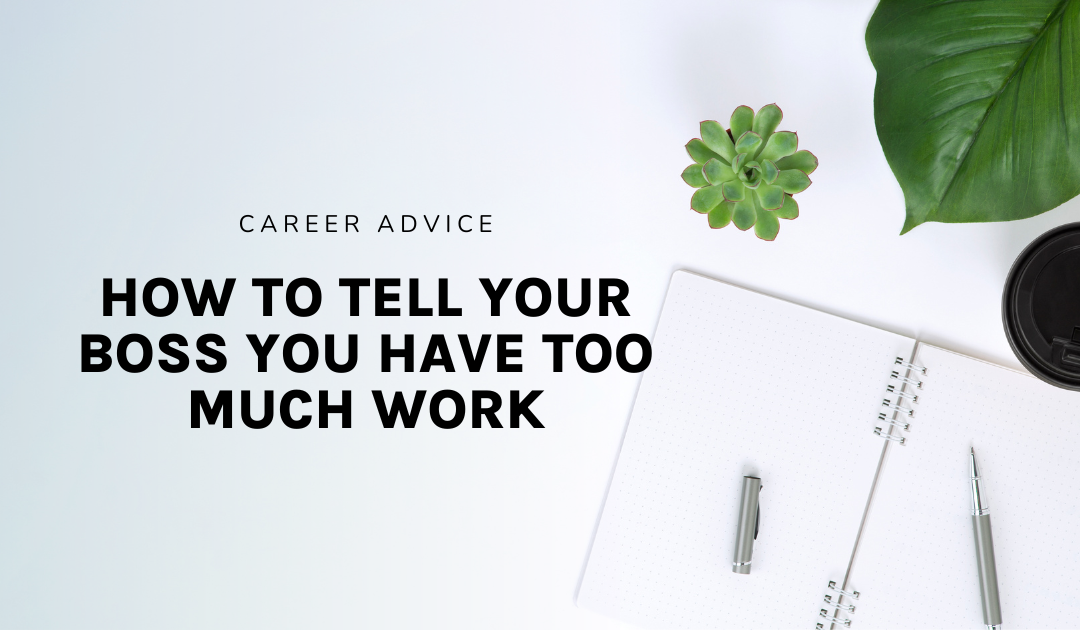Ever found yourself feeling overwhelmed by how much work you have and not sure what to do? Knowing when and how to communicate this to your boss is crucial to avoiding burnout in the workplace. If you want to learn how to tell your boss you have too much work and you’re at capacity, then keep reading!
Recognizing the Signs of Being Over Capacity
Do you often find yourself working late into the evening, long after your coworkers have logged off? Maybe you’re constantly feeling like you’re juggling too many tasks, with the fear of dropping the ball looming over you. Or maybe you keep getting more projects added to your plate, and you feel like it’s just a matter of time before things start slipping through the cracks, including your own health and wellness.
These are classic signs that you might be over capacity in your current role and potentially on the road to burnout.

How to Tell Your Boss You Have Too Much Work
It starts subtly – an extra project here, an additional responsibility there. Gradually, it turns into an endless tide of emails, deadlines, and meetings that eat away at your productivity and well-being. Feeling perpetually exhausted, struggling to focus, and a decreasing sense of job satisfaction are glaring indicators. If you get the Sunday Scaries every weekend, filled with dread for the coming week, it’s time to pause and assess.
Being over capacity is about consistently operating at a level that is unsustainable and potentially harmful.
This can lead to burnout, a state of emotional, physical, and mental exhaustion caused by excessive and prolonged stress. It’s important to recognize these signs early on to take proactive steps in addressing the issue with your manager or boss. Acknowledging that you’re over capacity isn’t a sign of weakness but a step towards a more balanced and productive professional life.
If you grew up with the messaging that you have to work really hard to be successful and had a strong work ethic hammered into you, it may be difficult to unlearn this behavior.
But the truth is, the old paradigm of work is changing. People no longer spend 30-50 years working at the same company, working their way up the ladder, and loyalty is a two-way straight between an employee and employer.
If the layoffs of the last few years have taught us anything, it’s that your employment status can change in a moment’s notice, no matter how hard you worked for the company or how much you went above and beyond. So do your future self a favor and prioritize your mental health by learning to set boundaries early on!
Related Post: I Hate My Job But I Can’t Quit
The Importance of Addressing Overwork
Have you considered the impact of being over capacity on your professional and personal life? First, you’ll want to determine whether this is a temporary phase, perhaps due to a crunch season or a specific project on a deadline, or if it’s an ongoing issue with no clear end in sight. That’s going to influence how you tackle this.
If the workload is project-based or seasonal, there might be a clear timeline for when things will return to normal. In such cases, short-term strategies to manage stress and time can be effective.
However, if there’s no end date to the excessive workload, it’s a signal that deeper changes are needed. This could be anything from reassessing your role and responsibilities to having a candid discussion with your boss about realistic expectations and achievable goals.
Not addressing being chronically overworked can lead to chronic stress or burnout, which is detrimental not just to your work performance but also to your health, happiness, and relationships. Proactively managing your workload and communicating your capacity ensures you maintain quality in your work and preserves your well-being. It’s about sustaining a healthy and fulfilling career in the long run.
Preparing to Talk to Your Boss
Before talking to your boss about your heavy workload, it’s important to do a little prep work. I know— it sounds like another project to add to your plate, but I promise it will be well worth your time!
Start by jotting down all the tasks and projects that are currently or regularly on your plate. Pinpoint the specific tasks or projects that are weighing you down. Are some tasks taking up more time than expected? Do some fall outside your usual responsibilities? Having clear examples will help paint a better picture for your boss.
Consider the timing. Is there anything pressing going on at work at the moment, such as multiple people being out on PTO, an event happening, or anything that would impact your workload or the ability for your boss to have the time and space for this conversation?
You may want to schedule a specific meeting to talk about this, bring it up in your next 1:1 meeting with your boss, or use a good ol’ Slack message for a more flexible approach.
Consider both your boss’s and your own communication preferences. If you typically handle most communication with 1:1 or even face to face in-person meetings, then that would be appropriate.
If it varies or you find that you want to carefully think through what you say in advance, then written communication could be more helpful to avoid getting nervous or flustered in the moment.
Also, it’s a good idea to think about solutions before the meeting. Maybe there are tasks that can be shared with a coworker or deadlines that can be pushed back. When you bring potential solutions to the discussion, it shows you’re not just raising a problem but are part of the solution too.
Related Post: How to Recover from a Toxic Work Situation
How to Tell Your Boss You Have Too Much Work
Ok, you’ve mapped out a specific meeting or quiet time for Slack communications and you’re ready to talk to your boss about your workload!
Here’s how to make your conversation as constructive and clear as possible:
Start with facts, not just feelings. Describe your workload with specifics. Mention deadlines, project sizes, or the number of tasks that are crowding your plate.
Lead with how it impacts your work. Explain how the workload affects your productivity or the quality of your output.
Are critical tasks suffering? Is there a risk to project outcomes or maintaining a high quality level?
Suggest practical solutions. Maybe it’s redistributing some tasks, bringing in temporary help, loosening deadlines, or reevaluating priorities. Show that you’ve thought about ways to make things better.
Be ready for a two-way conversation. Your boss might have insights or suggestions you hadn’t considered.
Try to approach the conversation with a collaborative, solutions-focused attitude. It’s not about listing complaints. It’s about finding a way for everyone to be in an environment in which they can do their best work and feel a sense of work-life balance.
End on a positive note. Reinforce your commitment to high-quality work and your willingness to find a balanced solution.
Moving Forward and What to Do If Your Boss Doesn’t Respect Your Request
First, I want to acknowledge you for even taking this sometimes scary but brave step of speaking up for your needs and setting boundaries between work and life.
This can be hard work, but it goes such a long way in making your work environment more sustainable for your wellbeing!
If your boss pushes back on you trying to set a more sustainable workload, there’s a few possibilities here. One is that perhaps the company is in crunch mode and needs all hands on deck to get a new product launched and get to all the new client projects in a timely fashion. This would be an example of a temporary situation that may require some time and stress management techniques.
In another situation, your concern might not be fixed in the moment but the company may realize they have a gap on the team (such as a single company recruiter getting bogged down with handling thousands of job applicants). Hiring more people could help alleviate workload in the long run, though it will take some time to get everything going.
And other times, you might find yourself in a workplace that has a deeply entrenched culture of working 80-100+ hours a week and having no personal time (I’m looking at you, finance and law!) and then it becomes up to you to decide if that’s a work environment you want to continue to be in.
It’s completely up to you, what your values are, and what you want to prioritize in life. If you are all career, all the time, then more power to you! But if family, relationships, and mental health are a priority and your workplace can’t respect that, then maybe you realize that you would actually love to land a new job offer instead of trying to stick it out.
If you’re interested in landing a more aligned job offer, check out my FREE on-demand masterclass to get the freshest strategies on how to go from feeling stuck to landing more ALIGNED interviews & offers.
Emily Liou and her team believe that everyone can land their dream job. Want to find out more about how you can wake up happier on Mondays? Whether you like to work at your own pace or have a group to hold you accountable, there’s a Happily Hired job search program to shortcut your job search today.














